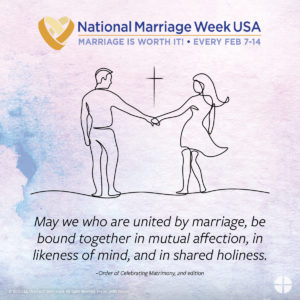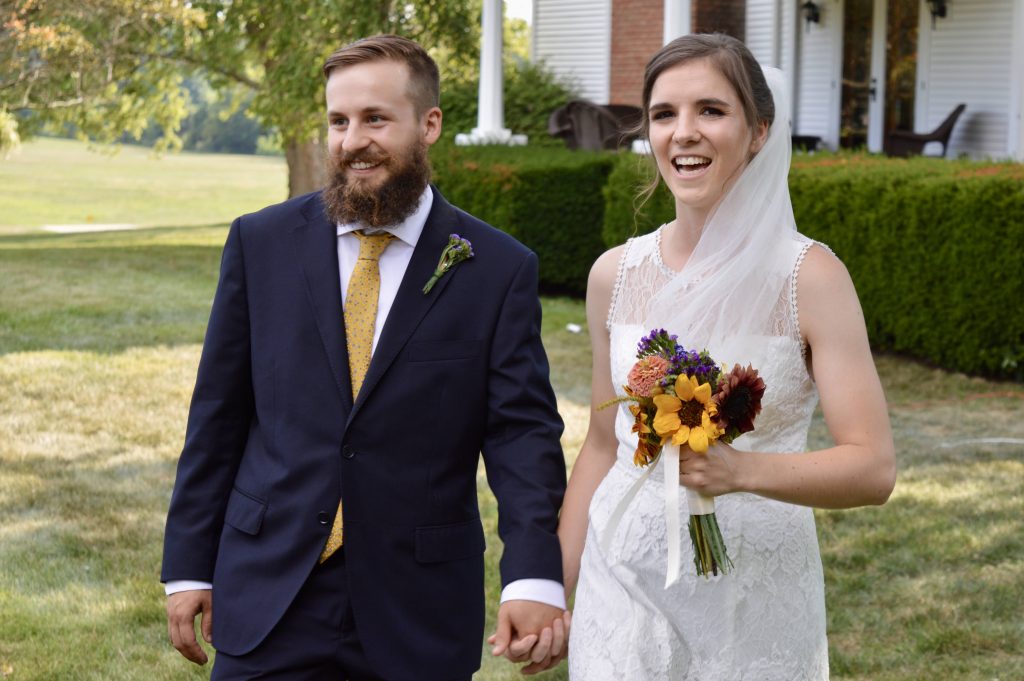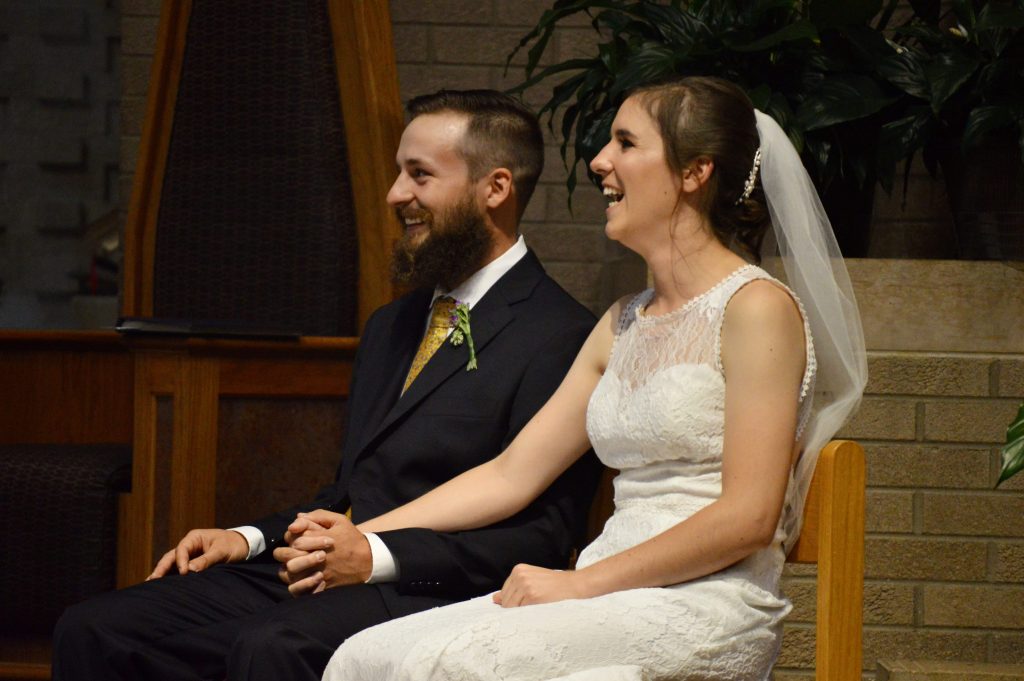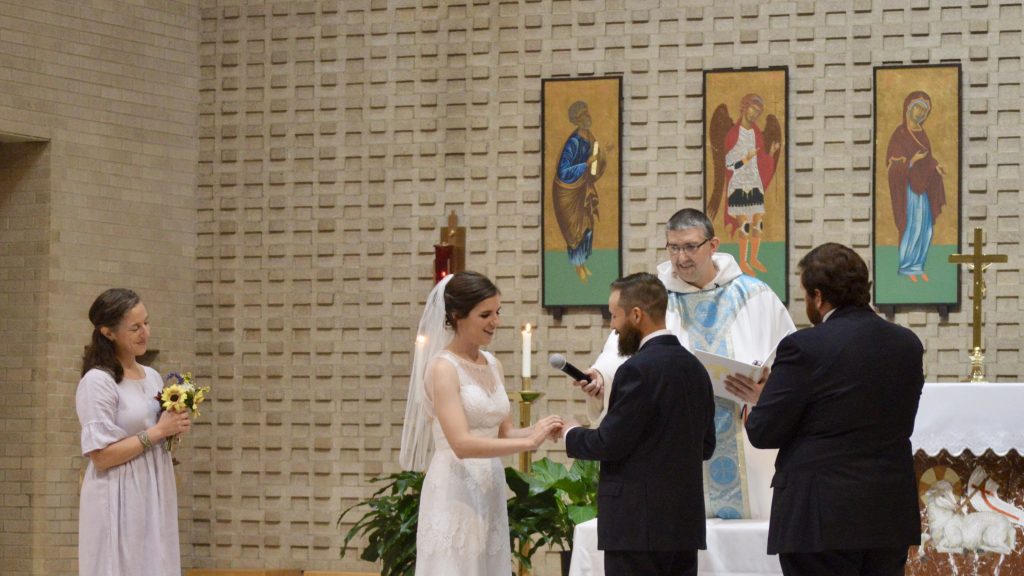February 9, 2021 // Diocese
Beyond ‘I do’: helping couples plan for a lifetime of marriage
 St. John Chrysostom once wrote about society that “there is nothing which so welds our life together as the love of man and wife.” Throughout the ages following the life of the Church father, Catholicism has continued to be a protector of and advocate for marriage and family life. Pope Emeritus Benedict XVI described the vocation as “the first building-block of a well-ordered and welcoming society.” The Catholic Church values family life so much that at the Second Vatican Council, it described the family as “the domestic church.”
St. John Chrysostom once wrote about society that “there is nothing which so welds our life together as the love of man and wife.” Throughout the ages following the life of the Church father, Catholicism has continued to be a protector of and advocate for marriage and family life. Pope Emeritus Benedict XVI described the vocation as “the first building-block of a well-ordered and welcoming society.” The Catholic Church values family life so much that at the Second Vatican Council, it described the family as “the domestic church.”
As beautiful as the statements may sound, one need not look far to see this “building block” of society and the Church seemingly crumbling. The role of marriage in society, and even its basic definition, seem to be fading.

Provided by Raquel Storey
Part of the purpose of the diocesan Marriage and Family Ministry is to encourage and equip couples and families to deepen their relationship with each other and with God so that they can grow in holiness and live out the Gospel. Raquel Storey of South Bend, who married her husband, Stephen, last summer, was grateful for the formation and direction. “The work of marriage — namely, getting your spouse to heaven — is an incredible privilege,” she said.
But the Church has not wavered in proclaiming the good news of God’s plan for marriage. For the Diocese of Fort Wayne-South Bend, this has meant maintaining a constant engagement with couples in order to help them learn about God’s plan for them. As Lisa Everett, director of Marriage and Family Ministry, said, the office’s purpose is to provide “pastoral care for spouses and parents and … to encourage and equip couples and families to deepen their relationship with each other and with God so that they can grow in holiness and live out the Gospel.”
The ways the ministry has reached out to couples have both expanded and faced quick adaptations in the past decade. One continuous method of engagement is a brochure titled “Before You Say I Do,” first published under Bishop John M. D’Arcy and re-promulgated by Bishop Kevin C. Rhoades in 2011. In the brochure, the diocese outlines the standards that the Church will ask couples to abide by before joining in marriage. The main focus of the brochure, which functions in a Q&A format, is the expectation that couples live chastely while they prepare for marriage.
There are both metaphysical and sociological reasons for the request. Firstly, the Church understands marital relations to be a profound gift of self that can only be fully realized in a public, permanent and hence unconditional commitment. If a couple lives together before marriage, even if their intent is to love the other and their plan is to stay together, there is still the implicit reality that cohabitation is a sort of trial run because, in the words of Everett, it is “based not on a gift of oneself but on a loan of oneself for an undetermined period.” Ultimately, between cohabitation and marriage is “the difference of unconditional permanence versus trial run.”
Furthermore, setting theology aside, there is ample sociological evidence of the benefits waiting until marriage to live together, or at least, if a couple has already been cohabitating, pausing until they are married. On the first page of the brochure, the diocese writes that, “The Church is particularly concerned about cohabitation because the practice is so common today and because it actually decreases a couple’s chance of having a successful marriage … By carrying a ‘cohabiting mindset’ into marriage, they are then at greater risk for divorce.”
In an interview with Today’s Catholic, Everett acknowledged the challenges many couples face. She said about couples that “the world in which they have grown up in is very difficult and many couples have grown up not seeing many examples of the place of sex in marriage.” Despite this somber reality, she offers hope to those aspiring to chastity.
“More and more, the Church really wants to reach out to couples … with love above all and to share with couples the truth, beauty and goodness of God’s plan, which is a plan for their happiness. What I really want to encourage every engaged couple is to really trust in God’s love for you and that He desires your happiness even more than you do.”
Marriage and Family Ministry also hosts events like “Just Desserts” and a Conference for Engaged Couples. Both had to adapt in the past year, in the face of the pandemic. The Conference for Engaged Couples successfully transitioned into an online webinar. It covers a range of topics from theology of the body to dealing with in-laws and finances. In its original form the conference was a one-day event, but in its new form it is split into three two-hour sessions over two days, Everett has found couples use the breather between sessions to process the content that was covered. Lisa and her husband, Deacon Frederick Everett, who runs the webinar with her, have also seen an increase in attention and absorption of the concepts.
“Just Desserts,” a date night for engaged and married couples, didn’t transition as well. Pioneered last February, couples would come and listen to a talk while enjoying a smorgasbord of desserts and fair-trade beverages. The speaker would present on such topics as deepening a couple’s relationship and prayer life as a couple to family of origin issues. Lisa and Caty Burke, associate director of the office, tried to transition this to an online platform in the fall but “fellowship with other couples was a big draw” to the in-person events, Lisa explained. Besides that, there were no desserts.
One of the main services Marriage and Family Ministry offers to engaged couples is a one-day marriage preparation program. Participants attest to the fruits of the program both before and during the pandemic.
Raquel and Stephen Storey of South Bend were married last summer and attended the preparation program – currently taking the form of a webinar — in the spring. They said their mentoring couple, who guided them through the FOCCUS inventory, “provided a great opportunity to touch on many of the important discussions in married life and glean from their own wisdom and experience.”
Jessica and Alex King, who were also married last summer in South Bend, spoke highly of a program called The Engaged Encounter, saying that it “was thoughtfully put together and covered the basics of what it means to be married. We loved seeing all the couples who were also getting married in the Catholic Church. It made us feel like we were not alone on the journey ahead.
“I remember we left the program giggling and holding hands as we talked about our love language and how we can better express the sacrificial love of marriage to each other. It was really nice to just take a day away from wedding planning and focus on our relationship and future marriage.”
When asked what it was like to prepare a wedding during COVID-19, Raquel responded: “It seems that wedding planning is a gauntlet for engaged couples under normal circumstances, and navigating the unpredictable and volatile public health situation was certainly an added challenge. It was a blessing at the same time, though, in that we started to learn how to work together as a team in times of uncertainty and stress.
“There was also freedom in knowing that any ideal of a “perfect” wedding was out the window, letting us focus on the most important elements which COVID-19 couldn’t affect: the sacramental grace, the beginning of our life together, and celebrating that in the Church. We were ultimately overwhelmed with gratitude by the profound beauty in the simplicity of it all.”
Raquel advised engaged couples to “work on cultivating wonder and gratitude. The work of marriage — namely, getting your spouse to heaven — is an incredible privilege. Allowing yourselves to be filled with wonder over one another and this mutual goal helps ground you both in what is most essential.”
“Honest conversation is a necessity,” said Jessica. “Marriage is not a magic fix for relationship or personal problems, so you must be open with each other. Also, it is never too late to begin practicing chastity and loving each other as God intended.”
Living chastely, both before and after marriage, may be one of the most difficult challenges facing marriage and the family today. Stephen and Raquel admitted that living chastely “is one of the Church’s legitimately hard teachings that is a real sacrifice for many people. But, they continued, “like all of the Church’s hard teachings, there’s a lot of grace in embracing them.”
The best news. Delivered to your inbox.
Subscribe to our mailing list today.








